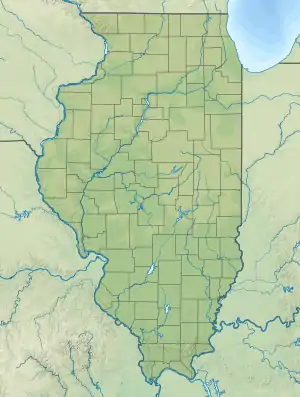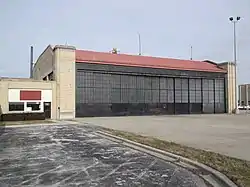Lansing Municipal Airport
Lansing Municipal Airport (ICAO: KIGQ, FAA LID: IGQ) is a public airport located 21 miles (34 km) south of Chicago, in Lansing, a village in Cook County, Illinois, USA. It is owned by the Village of Lansing.[2]
Lansing Municipal Airport | |||||||||||||||
|---|---|---|---|---|---|---|---|---|---|---|---|---|---|---|---|
| Summary | |||||||||||||||
| Airport type | Public | ||||||||||||||
| Owner | Village of Lansing | ||||||||||||||
| Serves | Chicago, Illinois | ||||||||||||||
| Location | Lansing, Illinois | ||||||||||||||
| Opened | April 1940[1] | ||||||||||||||
| Elevation AMSL | 620 ft / 189 m | ||||||||||||||
| Map | |||||||||||||||
 IGQ Location of airport in Illinois  IGQ IGQ (the United States) | |||||||||||||||
| Runways | |||||||||||||||
| |||||||||||||||
| Statistics (2004) | |||||||||||||||
| |||||||||||||||
Although most U.S. airports use the same three-letter location identifier for the FAA and IATA, Lansing Municipal Airport is assigned IGQ by the FAA but has no designation from the IATA.[3]
Facilities and aircraft
Lansing Municipal Airport covers an area of 650 acres (260 ha) which contains two asphalt paved runways: 9/27 measuring 3,395 x 75 ft (1,035 x 23 m) and 18/36: 4,002 x 75 ft (1,220 x 23 m).[2] It also houses a blimp base which launches 1/4 of the blimps that cover Chicago sporting events.
For the 12-month period ending December 31, 2004, the airport totaled 54,000 aircraft operations, an average of 147 per day: 91% general aviation and 9% air taxi. In November 2016, there were 143 aircraft based at this airport: 113 single engine, 15 multi-engine, 5 jet, 9 helicopter and 1 ultralight.[2]
Ford Hangar at Lansing Municipal Airport
Ford Airport Hangar | |
 Ford Hangar in May 2012 | |
| Location | 3250 Bob Malkas Drive Lansing, Illinois |
|---|---|
| Coordinates | 41°32′33″N 87°32′18″W |
| Built | 1926 |
| Architect | Albert Kahn |
| NRHP reference No. | 85001009[4] |
| Added to NRHP | May 9, 1985 |
The Ford Hangar, located at the Lansing Municipal Airport in Lansing, Illinois, is an airplane hangar built beginning in 1926, and completed by early January 1927. It was established as a historic building on the National Register of Historic Places in 1985.[5] It was built under the direction of Henry Ford to serve as a facility to produce and display Ford Tri-Motor airplanes.[6]
Ford purchased 1400 acres of land in Lansing in 1923 to build an airport to connect southland Chicago with his factories in Detroit.[7] Beginning June 1, 1926, work began on clearing land to build the hangar which was expected to, upon completion, hold three of Ford's Tri-Motor planes.[8] Architect Albert Kahn oversaw the design and construction of the building. He was Henry Ford's chief architect and wanted to design a space that would solve a number of problems found in early hangars.[5] He incorporated a number of innovations into the building that had not existed in airplane hangars prior to that time. Most hangars were often poorly designed, temporary buildings that were not well lit.[9] To solve this, Kahn incorporated three distinct features into the building. He used an architectural technique known as cantilevered construction that allowed the interior of the building to be open without need for columns to support the building, as well as reduce wind pressure on the building.[5] In addition he designed the hangar doors on the north and south side of the building to be easily moved by just one person. Operating on a wheeled track located on the inside of the building, the doors could be opened to any length by one person, regardless of the current wind or weather conditions.[10] In addition, Kahn also looked to improve the overall environment of the building by incorporating as much natural light in the building as possible. As a result, he incorporated five large 15 by 18 foot window openings that, when combined with the open sliding doors, allowed for natural light to reach about 40 percent of the total floor area of the hangar.[11] Ford's dreams of Tri-Motor construction were hampered by the beginning of the Great Depression. Ford stopped making airplanes by July 1932, and rented the airport land and the hangar to his former airport manager Elmer L. Browne, and later the Hammond aviator Guy W. Amick.[11] The hangar and the airport were acquired by the Village of Lansing in 1976 in order to qualify for federal funding.[12] The hangar was in its original use until 2011, when it was vacated for preservation purposes. Efforts to rehabilitate the building to its original appearance are currently underway.[13]
Incidents
- On July 24, 1966, a Beechcraft Bonanza bound for Lansing Municipal Airport crashed on a nearby golf course. The pilot and all three passengers were killed. On board the plane was professional golfer Tony Lema and his wife.
- On October 14, 2004, a Cessna 172 inbound for Runway 27, at 5:57 a.m., fell short due to bad weather and poor visibility. Nobody was injured.
- On March 9, 2007 a small plane crashed after takeoff from the airport at 7:30 pm. 2 people died. The plane crashed on Calumet Avenue in Munster, Indiana about 1 mile (1.6 km) away from the airport.
- On September 10, 2012, a gyroplane crashed in a field about 170 yards south of the runway, shortly after takeoff at 11:20 pm. The pilot, who was the only person on board, was pronounced dead at the hospital shortly after the incident.
- On October 5, 2019, a helicopter belonging to SummerSkyz Inc., lost its wheel, which then fell through the roof of a Lynwood, IL, residents' home. No one was home when the incident occurred and no one was injured.
References
- "Lansing Municipal Airport". AirNav, LLC. Retrieved 2016-10-18.
- FAA Airport Form 5010 for IGQ PDF, effective Nov 10, 2016.
- Great Circle Mapper: KIGQ - Chicago, Illinois (Lansing Municipal Airport)
- "National Register Information System". National Register of Historic Places. National Park Service. March 13, 2009. Retrieved April 24, 2015.
- "Persistence Gains Honor". The Times. September 23, 1985.
- Molloy, Mike (August 8, 1981). "Lansing Municipal Airport Has A Long And Lofty History". Sun Journal.
- "Ford Takes First Steps To Prepare His Landing Field". The Lake County Times. March 13, 1923.
- "Ford's New Hangar Done By Autumn". The Lake County Times. July 19, 1926.
- "Ford Hangar Brings Honors To Lansing". Chicago Sun Times. October 13, 1985.
- Bluestone, and Christian, Daniel M. and Harold J. (1984). National Register of Historic Places Inventory-Nomination Form. p. 6.
- Bluestone, Daniel; Harold J. Christian (August 1985). "The Ford Airport Hangar". Historic Illinois. 8 (2): 1–6.
- "Lansing Municipal Airport: History and Mission". Retrieved April 24, 2015.
- Tejeda, Gregory (January 21, 2012). "Officials Want Foundation To Help Renovate Lansing Airport's Historic Hangar". Northwest Indiana Times. Retrieved March 27, 2012.
External links
- Lansing Municipal Airport (official site)
- Resources for this airport:
- FAA airport information for IGQ
- AirNav airport information for KIGQ
- FlightAware airport information and live flight tracker
- NOAA/NWS weather observations: current, past three days
- SkyVector aeronautical chart, Terminal Procedures